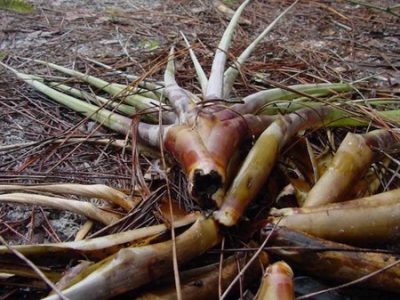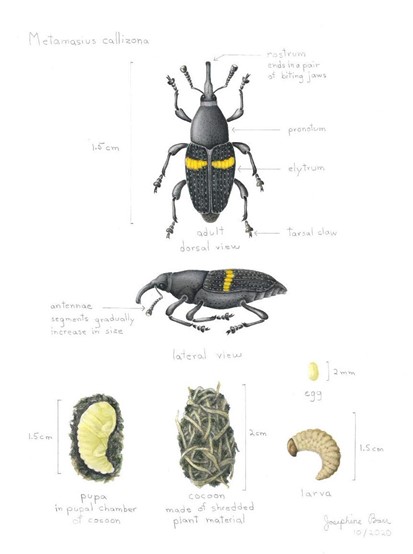
Photo Credit: Teresa Marie Dreams
Florida’s large airplants (Tillandsia utriculata, T. fasciculata, Guzmania monostachia, and others) have been under attack for over three decades by an invasive pest called the Mexican bromeliad weevil (Metamasius callizona). The weevil chews holes in the leaf bases of the bromeliads, then lays its eggs. All life stages of the weevil may be present in the same plant, taking roughly 58 days to progress from egg to adult. As the larvae feed and mature, they eat the base, mining into the stem and often kill the plant. Unlike most bromeliads T. utriculata does not produce vegetative offsets after blooming. If they get weevil-attacked before flowering — and some Tilandsias can take up to 10 years to bloom — they are unable to produce seed, contributing to their dwindling population.
The Mexican bromeliad weevil was first encountered in a nursery in Ft. Lauderdale, Florida in 1989. It was brought in through a shipment of bromeliads imported from Veracruz, Mexico. The beetle was unsuccessfully treated and within two months the weevil was found both north and south of Brevard County. By 2009 it was found in 23 additional counties and Tillandsia utriculata and T. fasciculata were added to the list of endangered species. In addition to attacking bromeliads in public lands, parks, and preserves the weevil is also known to infest private bromeliad collections and nurseries in which many more species of bromeliad may be mined and killed. Adult beetles range from 11 to 16 mm long and are black with a thin orange band width-wise across their elytra (the hardened forewing of beetles). These invasive beetles, when observed, should be terminated as they do not have the same natural predators they do in their native habitats.
Citizen science can be used to help track the spread of the beetle by documenting populations of T. utriculata and any damage that may be caused by the Mexican bromeliad weevil. If you find them or suspected damage caused by them, please upload your observations onto the iNaturalist database. For December 2021 the Sarasota Manatee EcoFlora project will keep its attention on the Tillandsia population and continue the Tilly Tally Two EcoQuest.

Please join us for our upcoming BioBlitz December 14th 9am-12pm at Jelks Preserve and register with the link below. https://7082.blackbaudhosting.com/7082/Jelks-Preserve-BioBlitz
